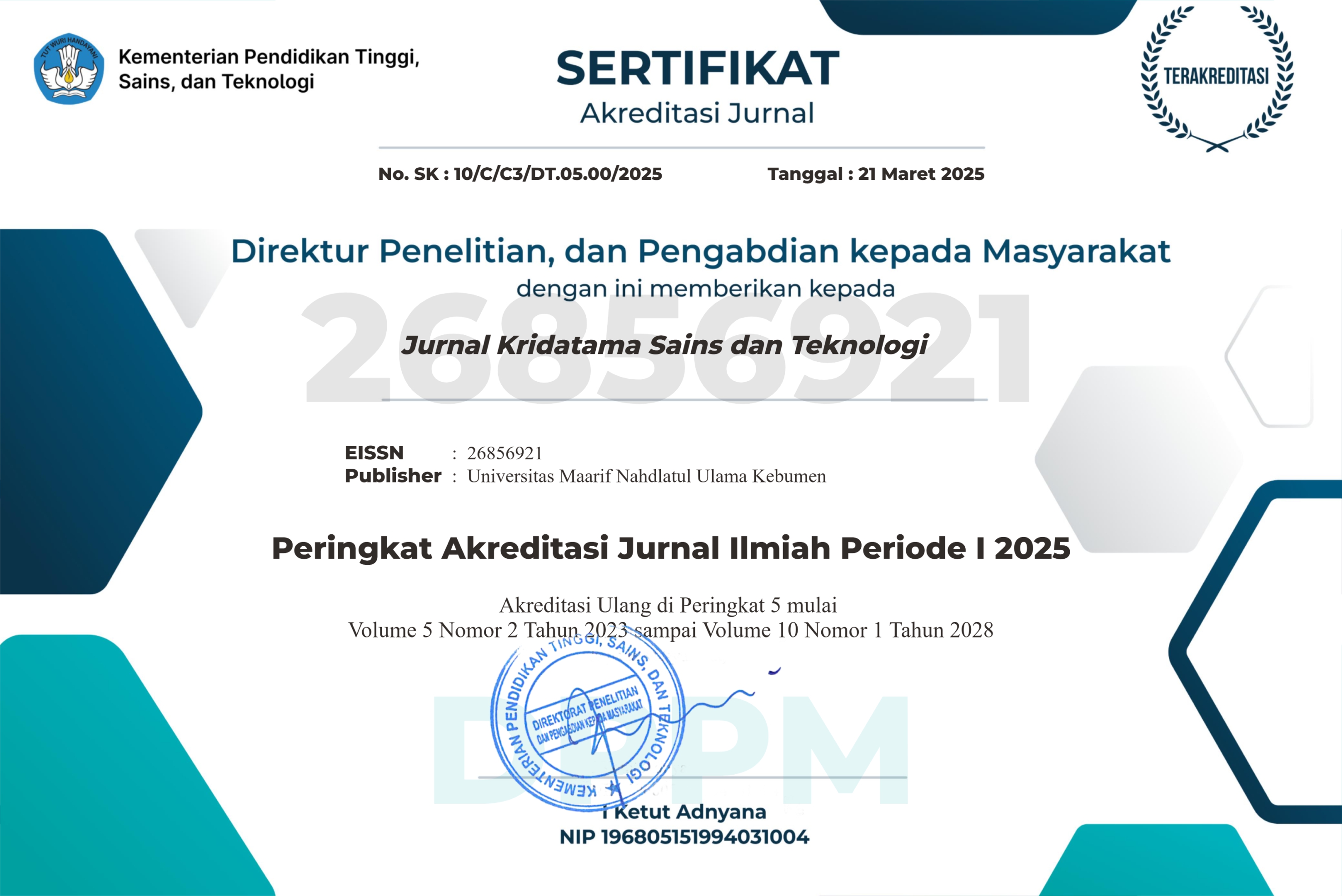Implementasi Program SAPAMAT untuk Meningkatkan Pemahaman Siswa Kelas IV pada Materi Bangun Datar
DOI:
https://doi.org/10.53863/kst.v6i02.1252Keywords:
Build Flat, Student Understanding, SAPAMAT ProgramAbstract
Mathematics is an important subject to apply. Therefore, mathematics is taught at every level of education. Mathematics is widely used in everyday life. Many people assume that mathematics is a troublesome illustration, this assumption has been passed down from time to time, so that the mentality towards mathematics is always considered troublesome. This is also experienced by fourth grade students of SD Negeri 3 Tugu and SD Negeri Pakuran who have difficulty learning mathematics on plane geometry material. Based on the results of initial observations on fourth grade students of SD Negeri 3 Tugu and SD Negeri Pakuran, students have difficulty in plane geometry material which includes properties, composition, decomposition of plane geometry. Understanding the concept and remembering the properties of plane geometry is often a challenge for students. Therefore, the SAPAMAT program is used in this study to help fourth grade students understand plane geometry material better. The SAPAMAT program stands for the Mathematics Breakfast Program or can be called morning lessons. This study uses the Quasi Experiment method with the Nonequivalent Control Group Design model. This study uses 2 groups, namely the experimental class group and the control class group. Pretest and posttestare the methods used to collect data. Normality test, homogeneity test, average difference test, and n-gain test are the data analysis methods used. The results of the statistical analysis of the average gain value of the experimental class are 0.78 while the control class is 0.31. This is reinforced by the average gain difference test, namely the sig p-value of 0.000. P-value 0.000 <0.05 so that H0 is rejected and H1 is accepted. This means that there is a difference in the increase in the abilities of students in the experimental class and the control class. Therefore, it can be concluded that the SAPAMAT program has an effect on increasing the understanding of grade IV students in the material of flat shapes
References
Amaliyah, A., Uyun, N., Deka Fitri, R., & Rahmawati, S. (2022). Analisis Kesulitan Belajar Siswa Pada Materi Geometri. Jurnal Sosial Teknologi, 2(7), 659–654. https://doi.org/10.59188/jurnalsostech.v2i7.377
Anjarsari, M. D. (2017). Meningkatkan Hasil Belajar Materi Mengidentifikasi Sifat-Sifat Bangun Datar Menggunakan Media Tangram di Sekolah Dasar. Jurnal PGSD, 01(2), 1–6.
Azis, A., & Ali, S. (2020). Pengaruh Jam Belajar Pada Mata pelajaran Matematika terhadap Prestasi Belajar Siswa Kelas XI SMA Negeri 1 Batauga. Jurnal Akademik Pendidikan Matematika, 5(November), 94–101. https://doi.org/10.55340/japm.v5i2.179
Bari, F., Syarif, C. R., & Hidayatullah. (2015). Pengaruh Model Pembelajaran Kooperatif Tipe Jigsaw dan Kecerdasan Emosional Terhadap Hasil Belajar. JTPPm (Jurnal Teknologi Pendidikan Dan Pembelajaran) : Edutech and Intructional Research, 2(2), 176–191.
Bay, R. R., Algiranto, A., & Yampap, U. (2021). Penggunaan Media Microsoft Power Point untuk Meningkatkan Pemahaman Siswa Sekolah Dasar. Jurnal Elementary: Kajian Teori Dan Hasil Penelitian Pendidikan Sekolah Dasar, 4(2), 125–133. http://journal.ummat.ac.id/index.php/elementary/article/view/5215
Broadhurst, R. (2020). Ind ex. Managing Environments for Leisure and Recreation, 1(2), 373–377. https://doi.org/10.4324/9780203457306-42
Fahrudin, F., Ansari, A., & Ichsan, A. S. (2021). Pembelajaran Konvensional dan Kritis Kreatif dalam Perspektif Pendidikan Islam. Hikmah, 18(1), 64–80. https://doi.org/10.53802/hikmah.v18i1.101
Gafoor, K., & Kurukkan, A. (2015). Why High School Students Feel Mathematics Difficult? An Exploration of Affective Beliefs [¿Por qué los estudiantes de secundaria sienten las matemáticas difíciles? Una exploración de creencias afectivas]. UGC Sponsored National Seminar on Pedagogy of Teacher Education Trends and Challenges, August, 1–6. bit.ly/37OLqE7
Maufiroh, Y., Afifulloh, M., & Safi’i, I. (2021). VICRATINA : Jurnal Pendidikan Islam Volume 6 Nomor 4 Tahun 2021 e-ISSN: 2087 – 0678X. VICRATINA: Jurnal Pendidikan Islam, 6(3), 53–61.
Muyassaaroh, I. K. (2021). Belajar Efektif dan Efisien untuk Problem Belajar Siswa yang Berprestasi Rendah. Heutagogia: Journal of Islamic Education, 1(1), 87–96.
Nursalma, A., & Pujiastuti, H. (2023). Pengaruh Waktu Belajar Dan Motivasi Belajar Terhadap Hasil Belajar Matematika. OMEGA: Jurnal Keilmuan Pendidikan Matematika, 2(3), 135–141. https://doi.org/10.47662/jkpm.v2i3.479
Pramestika, L. A. (2021). Efektivitas Penggunaan Media Power Point Terhadap Hasil Belajar Matematika Materi Bangun Datar Dan Bangun Ruang Sd. Jurnal Pendidikan Dan Konseling (JPDK), 2(1), 110–114. https://doi.org/10.31004/jpdk.v1i2.610
Rachmat, R., Mujahidin, E., Tamam, A. M., & Alim, A. (2022). Waktu-waktu efektif belajar menurut para ulama dan santri. Ta’dibuna: Jurnal Pendidikan Islam, 11(1), 52. https://doi.org/10.32832/tadibuna.v11i1.6011
Simbolon, S., Sapri, S., & Sapri, S. (2022). Analisis Kesulitan Belajar Siswa Kelas IV Materi Bangun Datar di Sekolah Dasar. Edukatif : Jurnal Ilmu Pendidikan, 4(2), 2510–2515. https://doi.org/10.31004/edukatif.v4i2.2081
Sinaga, W., Parhusip, B. H., Tarigan, R., & Sitepu, S. (2021). Perkembangan Matematika Dalam Filsafat dan Aliran Formalisme Yang Terkandung Dalam Filsafat Matematika [The Development of Mathematics in Philosophy and the School of Formalism Contained in Mathematical Philosophy]. SEPREN: Journal of Mathematics Education and Applied, 02(02), 17–22.
Siregar & Restati. (2017). Persepsi Siswa Pada Pelajaran Matematika: Studi Pendahuluan Pada Siswa yang Menyenangi Game. Prosiding Temu Ilmiah X Ikatan Psikologi Perkembangan Indonesia, 224–232.
Downloads
Published
How to Cite
Issue
Section
License
Copyright (c) 2024 Lintang Pandu Kusuma, Riana Irawati, Aah Ahmad Syahid

This work is licensed under a Creative Commons Attribution-ShareAlike 4.0 International License.
Authors retain copyright and grant the journal right of first publication with the work simultaneously licensed under a Creative Commons Attribution-ShareAlike 4.0 International License that allows others to share the work with an acknowledgment of the work’s authorship and initial publication in this journal

















